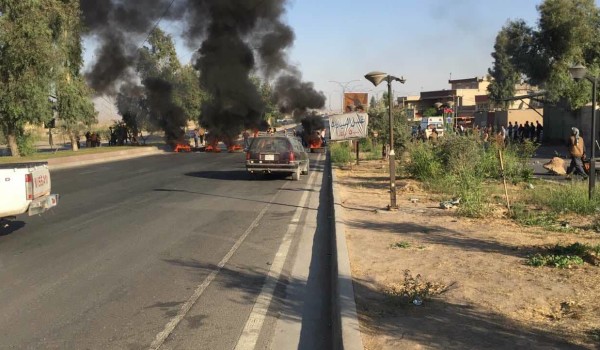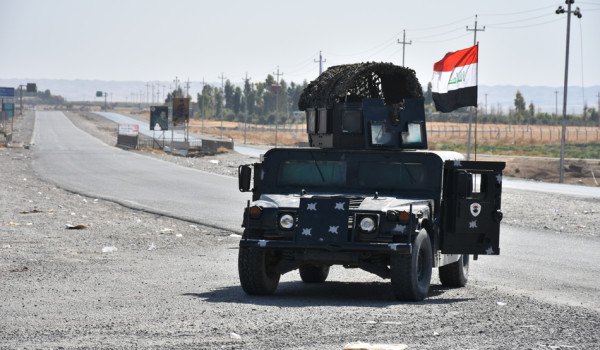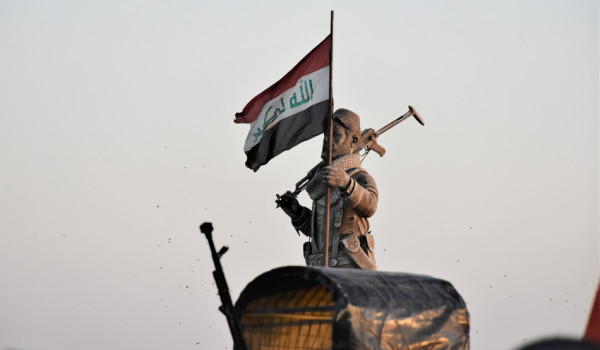The troops under the command of the Patriotic Union of Kurdistan (PUK) surrendered their positions in Kirkuk to Iraqi forces without any resistance on October12th, 2017.
The pullout of the Kurdish Peshmerga (Fighter) forces from Kirkuk and other disputed territories which were called the October 16 events, in fact, started on October 12th with the evacuation of Peshmarga positions and ended with the deployment of Iraqi federal forces in Kirkuk and other disputed areas.
The days anteceded the retreat of the Peshmerga
The PUK were divided into two fronts. The majority of the party leadership in Kirkuk were directed by Bafel Talabani, the elder son of the Late Secretary General of PUK Jalal Talabani, who ordered the handover of their positions to the Iraqi forces; meanwhile, the others were supporting the Kurdistan Democratic Party (KDP)’s stance to confront the will of Baghdad.
On Saturday, October 14, Bafel Talabani secretly ordered his party’s forces to pull out of the areas they were controlling, complying to a 48-hour-deadline given by the Iraqi government, according to sources from the PUK’s security forces. A fraction of these forces had even withdrawn prior to that date.
After Kurdistan Region authorities held a referendum on independence, the Iraqi parliament and government decided to deploy federal forces to Kirkuk and other territories disputed by Baghdad and Erbil. They set 2 a.m. of October 15, 2017 as the zero hour for the implementation of the decision.
On October 12, Bafel Talabani, whom the PUK media was dubbing as the man in charge of counter terrorism affairs in a message urged for the formation of a joint administration in Kirkuk and emphasized that “if it is necessary, a new governor should be also appointed”. He also stressed that the PUK should lead the efforts to prevent an imminent confrontation in the disputed territories.
Soon later, Hero Ibrahim Ahmed, a PUK politburo member, who was considered an influential figure in the PUK, called for calming the situation in Kirkuk and demanded restraint by both the Iraqi forces and the Peshmerga.
Both messages were delivered on Friday, October 13, prior to the escalation of the situation in the areas around Kirkuk as Iraqi forces began to mobilize, while the Peshmarga were on stand-by.

Kirkuk, October 16th 2017: Angry Kurds burn tires on main street to prevent Kurdish Peshmarga commanders, and party and government officials from leaving the city. KirkukNow
A video posted on the same day, showed members of the Iraqi Popular Mobilization Forces (PMF), a paramilitary group, seizing a position held by the PUK’s Peshmarga forces. Military commanders described the move as a military tactic.
Muhammad Haji Mahmoud, secretary general of the Kurdistan Socialist party who was then serving as a Peshmarga commander in Kirkuk, in an interview in 2018 on Rudaw TV, owned by Nechirvan Barzani, said, “Starting from October 12 until October 15, many areas in Kirkuk were abandoned by the Peshmarga, including Maryam Beg, Albu Najm, Albu Muhammad, Sab’a Nissan and other areas in souther Kirkuk’s Daquq district.” He indicated that these positions were “handed over to Iraqi forces.”
“They call it the October 16 events while actually it began on October 12 and ended on October 16,” he explained.
PUK and KDP at loggerheads
A faction within the PUK and the Peshmarga was in favor of reconciliation with Baghdad, an approach completely opposite to the KDP’s and its leader Massoud Barzani.
Barzani and KDP military commanders had repeatedly stressed that the Peshmarga would not retreat to the areas they were controlling prior to the arrival of the Islamic State (IS) group, and said they supported Najmaddin Karim to stay as Kirkuk governor.
The assertion came after the Iraqi parliament in mid-September, 10 days before the Kurds’ referendum on independence voted to dismiss Najmaddin Karim from his position. The session was boycotted by Kurdish fractions.
A day after Bafel Talabani’s message, Najmaddin karim along with Kamal Kirkuki, commander of the KDP’s forces in western Kirkuk, reaffirmed that “the Peshmarga will stay and will confront any forces that might advance towards Kirkuk.”
At that time, the majority of the areas which Baghdad was reclaiming were controlled by the PUK wing which was in favor of easing the situation.
On October 13, top PUK officials held a meeting to respond to Baghdad’s demands. The meeting was attended by then then president of Iraq Fuad Masoum who arrived in Sulaimaniya to seek ways to ease the tensions.
Baghdad was demanding the handover of areas it was controlling prior to the IS attacks in addition to some oilfields and the K1 military base.
Alongside KDP forces, a special brigade under the command of PUK deputy secretary general Kosrat Rasul was stationed in Kirkuk. According to Najmaddin Karim, the Iraqi demands were rejected, and the Peshmarga forces were ready to defend Kirkuk.
The PUK top official, who according to the party’s bylaws became acting PUK head after Jalal Talabani passed away on October 3, 2017, strongly supported Massoud Barzani’s decisions and views regarding the referendum and defending Kirkuk.
Despite the Peshmarga general commander and the Kurdistan regional government (KRG)’s warning of the deployment of federal forces to attack Kirkuk, the then Iraqi PM Haidar Abbadi and other officials reaffirmed that they had no intention attack Kurds.
Ahmed Asadi, spokesman to the PMF speaking to AFP confirmed that the federal troops were being mobilized towards southern Kirkuk under the command of the general commander of the armed forces to be redeployed in the areas they were in control until June 6, 2014. He added that “for this step, no confrontation or struggle would get in the way.”

Kirkuk- An Iraqi counter-terrorism Humvee on Kirkuk-Pirde road, October 20, 2017 Photo: KirkukNow
Attempts to prevent confrontations
Aras Sheikh Jangi, Jalal talabani’s nephew, who often appeared in the media at those times, said in an NRT TV documentary a year after the events that “three Iraqi army divisions and other heavily armed forces moved towards Kirkuk. They had notified the PUK and the KDP as well as their Peshmarga commanders about their intention to move in.”
“We halted the fighting for 48 hours; before the deadline ended we asked for another 48 hours but after intensive discussions they agreed to extend the deadline for another 24 hours,” according to Aras Sheikh Jangi who introduced himself as a mediator tasked with preventing the confrontation from happening.
“On the final day of the deadline, a meeting was held in Dukan. They sent me to tell the forces gathered in southern Kirkuk that we were giving them a final response the same day. I had lunch there aand returned to Sheikh Jafar and the other commanders. All of a sudden Nwechirvan Barzani and Mala Bakhtiyar appeared on TV in a joint press conference”, said Sheikh Jangi.
In the press conference, Nechirvan Barzani said they rejected the idea of freezing the results of the referendum and asked for dialogue to resolve the disputes. Overall, the meeting did not include the response which Baghdad was awaiting, although it was decided that the demands of Baghdad be discussed in a meeting attended by Massoud Barzani, Hero Ibrahim Ahmed, Fuad Massoum and other PUK politburo members.
Aras Sheikh Jangi said, “After I went back to talk to the Iraqi forces, they told me this is not a letter of peace; therefore we will move on. I said does it mean you are attacking; they said yes.”
Sheikh Jangi says he asked for another 24 hours but he was denied the request.
“I came back and told the commanders that I predict they would launch their attack tonight, because the deadline expired… It is up to you as military commanders; all I can do is giving you a warning,” said Aras.
Baghdad-PUK agreement
On October 16, when the Peshmarga forces withdrew from Kirkuk and other disputed territories, the KDP accused some PUK politburo members, among them the Talabani family, of betrayal. Bafel Talabani revealed an agreement signed by 38 PUK leadership committee members in regard to Kirkuk which he said dated back October 14.
According to the terms of the agreement, a joint military leadership would be formed in Kirkuk province including representatives of the US forces, the Peshmarga and the Iraqi army.
This leadership which is based in K1 military base is tasked with providing security and stability in these areas. Furthermore, it ensures that no military forces are brought into Kirkuk city.
During the October 2017 events, the role of Iran, particularly Qasim Sulaimany floats as the one who persuaded the PUK and Baghdad to sign the agreement, yet the Kurdistan Region’s rejection of Baghdad’s demands canceled the agreement and eventually the offensive started.
Soon after Jalal Talabani passed away, they went to Baghdad and signed the agreement
Najmaddin Karim, then governor of Kirkuk had repeatedly emphasized that Talabani’s son and nephew’s agreement signed in Bashir –a village in southern Kirkuk’s Daquq district- was about the withdrawal of the Peshmarga.
He told an NRT TV documentary that “soon after Jalal Talabani passed away, they went to Baghdad and signed the agreement, paving the way for Iraqi forces to enter Kirkuk.”
Meanwhile, Muhammad Haji Mahmoud says, “Even the timing was already set. They determined the time of withdrawal from specific positions. This all started on October 12.”
The Talabani family had denied involvement in such agreements except the one signed by the PUK leadership committee.
Wherever the truth lies, the day which Mala Bakhtiyar called October 16 and described it as a black day was supposed to be October 12.
“Everything started on October 12 and ended on October 16. Kosrat Rasul told me that a bad thing has been done and I hadn’t been told about it,” Muhammad Haji Mahmoud concluded.
* This follow up has been published in 2019 and it is re-published in the anniversary of October 16th 2017 events





